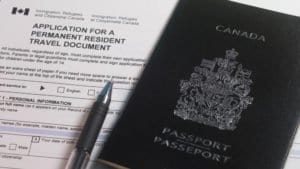Understanding Canadian Landed Immigrant Status
Canadian landed immigrant status, also known as a permanent resident, refers to an individual who has been granted permanent residence, a type of immigration status, after immigrating to Canada. Generally, unlike international students and foreign workers, those who apply for permanent residence intend to permanently stay in Canada.The immigration lawyers at Kahane Law Office are able to help with your immigration needs.
What Is A Permanent Resident?
Permanent residents are not Canadian citizens. Rather, they are citizens of other countries who intend to permanently stay in Canada. As a permanent resident, if you travel outside of Canada and return on a commercial vehicle (such as a plane, boat, train or bus), you are required to show your PR card and passport or risk being denied boarding.
How To Get Permanent Resident Status In Canada?
The five main ways you can obtain permanent residence includes:
- through skilled worker programs for individuals who have skilled work experience and intend to fill shortages in Canada’s labour market;
- sponsorship by Canadian family members such as spouses, parents and children;
- via business immigration programs for those willing to set up a business in Canada or invest a significant sum of money in the country;
- through Provincial Nominee Programs where, each year, provincial governments select a number of individuals to immigrate to their province as permanent residents; and
- via humanitarian programs, such as refugee programs, where asylum-seekers and individuals who are unable to return to their home country apply for permanent residence on humanitarian and compassionate grounds.
What Is Express Entry?
The express entry program is an online immigration application system that touts faster processing times for candidates applying through the Federal Skilled Worker program, the Federal Skilled Trades program and various Provincial Nominee programs. The express entry program is points-based where candidates are placed in a pool and accumulate points based on language skills, work experience, age, education, and whether they have a job offer. Consequently, the top-ranked candidates obtain priority in receiving an invitation to apply for permanent residence.
What Is A Permanent Resident Card (PR Card)?
Instead of receiving a passport, permanent residents receive a PR card which are generally valid for five years (some PR cards expire after one year). PR cards prove that an individual has permanent resident status in Canada. A PR card serves as an important travel document as, provided that it is valid, it allows landed immigrants to return to Canada. PR cards are renewable continuously on maintaining residency requirements.
Am I A Landed Immigrant If I Make A Refugee Claim?
Even if you make a refugee claim in Canada, you do not automatically become a permanent resident. In order to become a landed immigrant, the Immigration and Refugee Board must first approve your claim. Next, you must apply to become a permanent resident.
What You Can Do As A Permanent Resident
Permanent residents enjoy many of the same benefits that Canadian citizens do. For example, they have the right to:
- live, study, or work anywhere across Canada;
- apply for Canadian citizenship;
- receive social benefits such as health care coverage; and
- protection under Canadian law including the Canadian Charter of Rights and Freedoms.
As A Landed Immigrant, Do I Have To Pay Taxes?
Landed immigrants must pay taxes owed at the federal, provincial and municipal levels. This is because income tax is based on residency in Canada rather than citizenship. While permanent residents must pay taxes on worldwide income, the existing assets of new immigrants prior to obtaining permanent residence are not taxed.
What You Cannot Do As A Permanent Resident
Landed immigrants are prohibited from:
- holding certain jobs that require high-level security clearance;
- running for political office; and
- voting in elections.
Can Landed Immigrants Live Outside Of Canada?
Yes, permanent residents may live outside of the country but must reside in Canada for at least two years in a five-year period. Those who live outside of Canada for longer periods of time may risk losing their permanent resident status. For more information on residency obligations, see the Government of Canada’s website here.
Is Landed Immigrant Status Lost If My PR Card Is Lost, Stolen Or Expired?
No, even if your PR card expires, you still retain your status as a permanent resident. If your PR card is lost, stolen or expired, it may make traveling abroad and returning to Canada a hassle. If returning to Canada on a commercial vehicle, you will either have to wait to renew your PR card or apply for a Permanent Resident Travel Document.
Tip: Before you plan your trip, you should check whether your PR Card is still valid. Aim to renew your card at least six months before the expiry date to avoid travel delays.
How Can I Lose Status As A Landed Immigrant?
You can only lose your permanent resident status if:
- granted status as a Canadian citizen;
- you voluntarily renounce your landed immigrant status;
- a removal order made against you comes into force; or
- following an inquiry or appeal, an adjudicator deems that you are no longer a permanent resident.
Lawyers For Landed Immigrant Status In Canada
The immigration lawyers at Kahane Law can assist you with your application for permanent residence. Our lawyers have experience dealing with a wide variety of immigration cases ranging from family sponsorships to humanitarian cases. We can also assist with applications for permanent resident card renewals and permanent citizenship applications. To reach us, give us a call In Edmonton, Alberta at (780) 571-8463 or to reach our Calgary Office at (403) 225-8810. Alternatively, call us too-free at 1-877-225-8817 or, for even quicker responses email us at our immigration hotlink here.

